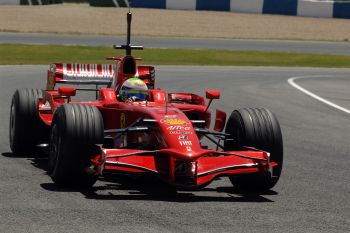 |
|
Since Hockenheim, Ferrari has carried out an
extensive in-depth investigation, both at
home in Maranello and during the four day
test at Jerez de la Frontera (above), into
what was behind this lacklustre showing. |
|
|
|
Budapest has
changed a great deal since the first time Formula 1
visited here in 1986, when it provided an exotic taste
of life behind the Iron Curtain. Scuderia Ferrari
Marlboro has won five times in those twenty two years
and two of those victories stand out: in 1989, Nigel
Mansell won from twelfth on the grid, which defied the
odds on a track known for the difficulty of passing
another car and in 1998, Michael Schumacher won with an
unusual three stop strategy. The German was the last man
to win at the Hungaroring in the Prancing Horse colours,
back in 2004. Driving for another team, Kimi Raikkonen
won the following year.
Back in the present day, Ferrari comes to Budapest after
two less than perfect race weekends, especially the last
Grand Prix where the team was not competitive enough to
fight for victory. Since Hockenheim, the team has
carried out an extensive in-depth investigation, both at
home in Maranello and during the four day test at Jerez
de la Frontera, into what was behind this lacklustre
showing. Data analysis was the main item on the agenda
behind the factory walls and there was daily
communication between the factory and the Spanish race
track, to exchange views. A great deal of effort went
into this analysis, as the team carried out comparisons
between set-up options, as well as mechanical and
aerodynamic parts that have been developed over the past
six weeks or so. The fact that ambient and track
temperatures at Jerez were very high and the abrasive
nature of the track surface certainly did not make this
analysis a straightforward task. However, by running the
comparison tests in consistent conditions in terms of
temperature and wind - especially with Kimi on Thursday
- a meaningful analysis was possible. The synthesis of
those investigations is that in Hockenheim, it was not
the car itself that had something wrong with it, in that
the package was not worse than the previous one: the
major difference was tyre related and for a variety of
reasons, Kimi Raikkonen and Felipe Massa were unable to
get the best out of the tyres during Sunday's race, even
if there had been little sign of this difficulty over
the previous two days of practice and qualifying.
"Despite the fact the last two races have been negative
for us, the Scuderia is definitely not in crisis,"
maintains Team Principal of the Gestione Sportiva,
Stefano Domenicali. "The team is still leading the
Constructors' Championship and theoretically, one of our
drivers could again be back at the top of the Drivers'
classification on Sunday night. We are on a similar
points tally to last year, we have won half the races so
far and indeed, taken half the pole positions. Just as
we never felt we were unbeatable after our French GP
victory, so too, we do not feel all is lost after the
British and German events. The entire squad is doing its
best to overturn this situation. We have come from
behind before and in fact, we have emerged as the top
team at the end of the season, having been in much
greater difficulty than we are now. If we look at where
Ferrari was in 2007 after ten races, today we are in a
much better position and this year, there is one more
race than last, which gives us even more opportunities
to fight back."
As for the characteristics of the Hungaroring, they are
well known: it requires, along with Monaco, the highest
downforce configuration and Bridgestone will bring the
same tyres as they did to the Principality, namely the
"Soft" and "Super-Soft." The F2008 was very competitive
in this trim, so there is no reason to think that should
not be the case this weekend. As usual, a strong
qualifying performance is a vital step on the road to
victory, with overtaking very difficult at this circuit,
but again, looking back to Monaco, the Ferraris were
very competitive there on the Super-Soft tyre used for
the one lap discipline. Usually, the race is based on a
two stop strategy, although last year, some drivers did
three, and starting the race on the clean side of the
track can be a significant advantage on a track that
always stays dirty off the racing line. It takes time to
rubber in, which can cause tyre graining on the first
day of practice, diminishing as the weekend goes on. As
far as engines are concerned, Kimi will have a new one
for this race, while Felipe's will be having its second
outing.
Tomorrow, Luca Badoer will carry out a shakedown at
Fiorano of the cars that will be used in Budapest. For
the first time on a race weekend, the F2008 will be
fitted with, amongst other new components, the "anvil"
engine cover, after Massa felt in Jerez that it brought
some benefits. The team will travel to Hungary with its
usual determination to aim for the win, with the added
incentive that it's always good to go into the "summer
break" on the back of a great result.
|